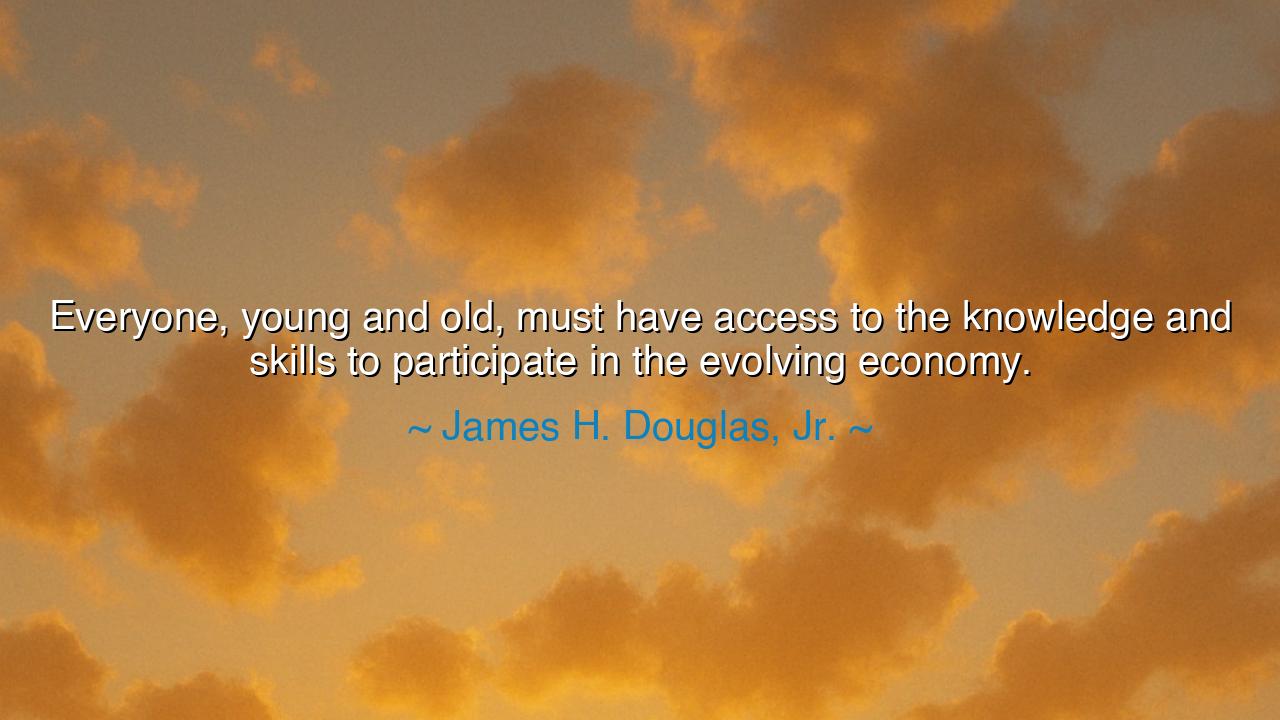
Everyone, young and old, must have access to the knowledge and
Everyone, young and old, must have access to the knowledge and skills to participate in the evolving economy.






The words of James H. Douglas, Jr. resound like a trumpet calling the people of every age to readiness and unity: “Everyone, young and old, must have access to the knowledge and skills to participate in the evolving economy.” Though born in the age of industry and progress, his wisdom belongs to all generations—for it speaks to the eternal truth that no society can stand if its people are left behind. In his words burns both compassion and foresight: compassion for the worker who struggles to adapt, and foresight for the child who must one day inherit a world more complex than his parents ever knew.
In the dawn of civilization, wisdom was passed from hand to hand, from elder to youth, like a sacred torch. The potter taught his son the shaping of clay, the blacksmith taught the rhythm of fire and iron, the scribe taught the mysteries of symbols. But the world of Douglas’s time—and our own—evolves faster than any age before it. The tools of yesterday are obsolete tomorrow; the trades of one generation dissolve into the algorithms of the next. In such a world, the old way of learning, slow and narrow, cannot suffice. Knowledge must flow freely, like a river that touches every life, renewing all who drink from it.
Douglas, a man who had served his country in both war and peace, knew that strength does not lie only in armies or wealth, but in the education of the people. He saw that the future belongs not to those who hoard wisdom, but to those who share it. The evolving economy, as he called it, is not merely a market of goods—it is the ever-turning wheel of human progress. If only a few are trained to turn that wheel, the rest will be crushed beneath it. Thus he declared that knowledge and skill are not privileges for the few, but rights for all—holy instruments by which both youth and age may labor with dignity in a changing world.
History itself bears witness to this truth. When the Industrial Revolution dawned upon Europe, many were left in darkness. Machines replaced hands, and those untrained in the new crafts were cast aside, their livelihoods swallowed by iron and steam. Yet in nations that opened schools, trained their workers, and taught new trades, prosperity flourished like spring after winter. The people who learned to master the machine rose above it; those who clung only to the past were buried beneath its wheels. Thus Douglas spoke not from theory but from the living lessons of history: education is the bridge between survival and progress.
And this truth is not only for the young. The elderly, too, must be honored with the means to learn anew. For wisdom is not the possession of youth alone, and skill can be renewed like flame from an ember. Many a worker, dismissed as too old to adapt, has proved that the mind, when inspired by purpose, can be reborn. There is a story of an old farmer in Japan who, in his sixties, learned computer programming to sell his harvest online. His hands were calloused, but his mind was bright; he bridged the ancient and the modern through sheer will to learn. Such souls embody Douglas’s vision—that all may partake in the fruits of the evolving age, not as relics of the past, but as living participants in the present.
Yet these words carry also a warning. When society neglects education—when it closes the gates of learning to the poor, the rural, the elderly—it plants seeds of division. Ignorance breeds despair, and despair breeds unrest. A nation cannot prosper when half its people are silenced by lack of access or skill. Therefore, to give knowledge and opportunity is not charity—it is preservation. It is the duty of every generation to lift the next, to ensure that the fire of learning does not flicker out in neglect.
O listener, take this wisdom to heart: knowledge is the new bread of the modern age, and it must be shared with all who hunger for it. Whether you are young or old, never cease to learn. Seek understanding in the tools of your time, that you may shape them rather than be shaped by them. Teach what you know, that others may rise with you. And if you hold power—whether over a company, a classroom, or a household—use it to open doors, not to close them.
For the message of Douglas is as timeless as the sunrise: a society that educates all its people is a society that endures. Let every man and woman, every youth and elder, walk hand in hand toward the horizon of change—not as strangers divided by age or station, but as one people, strengthened by shared wisdom and united by the eternal pursuit of growth.






AAdministratorAdministrator
Welcome, honored guests. Please leave a comment, we will respond soon